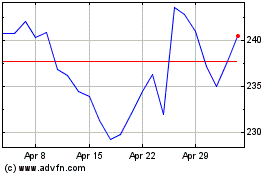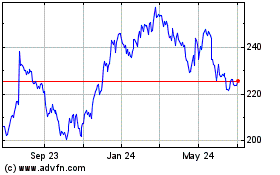U.S. Railroads Could Get Squeezed by Tariffs on Mexican Imports
May 31 2019 - 1:00PM
Dow Jones News
By Paul Ziobro
Proposed U.S. tariffs on Mexican imports would impact billions
of dollars of cargo moving across the border on railroads including
Kansas City Southern and Union Pacific Corp.
Both companies have spent billions of dollars upgrading
cross-border infrastructure in recent years to ferry Chevy
Silverado pickups, Corona beer and Mexican avocados into the U.S.
The railroad operators' shares were among those under pressure from
the tariff news on Friday, with Kansas City Southern trading down
6% and Union Pacific slipping 2%.
Kansas City Southern is closely tied to cross-border trade with
Mexico. It operates a network of track called the "Nafta Railway"
that can shuttle goods from Mexican factories and ocean ports to as
far north as Memphis, Tenn., bypassing congested U.S. West Coast
ports. It also carries Farm Belt commodities such as corn and U.S.
natural gas south into Mexico.
Transportation analysts at Citi estimate that 30% of the
railroad's revenue is directly tied to moving goods across the
border, and another 10% of transport business is handed off to
another carrier before crossing countries.
About 40% of that traffic involving Mexico moves north, Citi
estimates, with about a third intermodal shipments, a third
automobiles and the remainder a mix of commodities.
Kansas City Southern has warned investors about the perils of
trade tension with Mexico.
"Failure to preserve free trade provisions, or any other action
imposing import duties or border taxes, could negatively impact KCS
customers and the volume of rail shipments," the company said in
its latest annual report.
Union Pacific generated $2.5 billion last year in freight
revenue from Mexico, nearly 12% of its overall freight revenue.
Union Pacific is the only railroad that serves all six major rail
gateways to Mexico.
About 90% of Union Pacific's U.S.-bound shipments from Mexico
fell into the categories of automotive, beer and beverage and
intermodal containers. The railway doesn't carry U.S. cargo south
into Mexico, rather it interchanges at the border.
President Trump on Thursday said the U.S. would impose a 5%
tariff on all Mexican imports beginning June 10 in response to the
flow of migrants from Central America seeking asylum in the U.S.
The tariff would grow steadily to 25% on Oct. 1 unless Mexico takes
satisfactory action to halt the migrants.
Railroads worry that tariffs and other trade disputes could damp
global trade volumes. The carriers were active in shaping the
U.S.-Mexico-Canada Agreement, the pending successor to the North
American Free Trade Agreement.
Representatives for Kansas City Southern and Union Pacific had
no immediate comment.
At an investor conference in mid-May, Kansas City Southern's
finance chief, Michael Upchurch, said cross-border traffic with
Mexico was growing and touted the company's access to Mexico. He
said it was unclear how the U.S. trade fight with China would
affect rail volumes.
"There are some wild cards out there. The tariff issue and the
temperature around that right now, which is heating up rather than
cooling down, is a factor and that will clearly impact exactly what
the volumes end up being," he said.
Write to Paul Ziobro at Paul.Ziobro@wsj.com
(END) Dow Jones Newswires
May 31, 2019 12:45 ET (16:45 GMT)
Copyright (c) 2019 Dow Jones & Company, Inc.
Union Pacific (NYSE:UNP)
Historical Stock Chart
From Mar 2024 to Apr 2024

Union Pacific (NYSE:UNP)
Historical Stock Chart
From Apr 2023 to Apr 2024
